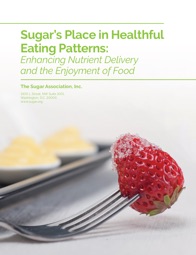News
19 December 2017
The wheelings and dealings of the sugar industry revealed by three Californian researchers
Six months ago, hungerexplained.org published, in its « Opinion » part, an article entitled « Sweetened Research, Sugared Recommendations » in which Jomo Kwame Sundaram and Tan Zhai Gen explained how the US sugar industry, through the Sugar Association, its so-called “scientific voice”, had paid researchers to minimise the deleterious effects of sugar on human health and to influence the drafting, during the ‘60s, of the first ever US dietary guidelines so as to ensure that they are not unfavourable to sugar consumption.
According to three University of California researchers, the sugar lobby had good reasons to be mobilised then, as research conducted by the sugar industry had demonstrated as early as in the ‘60s, based on experiments on rodents, that sugar could be a source of heart diseases as well as of bladder cancer. The Californian researchers succeeded in uncovering internal sugar industry documents that prove clearly that its leaders were well aware of the negative effects of sugar [read their work on on plos biology here], effects that they have later made efforts to conceal or minimise by criticising and undermining results of research conducted by independent scientists, or by funding pseudo studies providing evidence of the “positive” effects of sugar.

Today, in December 2017, if you take time to visit the Webpage of the Sugar Association, you will see, well highlighted, two articles. One praises the “positive role of the sweet taste in infant and toddler feeding” and is introduced by a sentence on how the association “supports important scientific dialogue on the role of sugar and sweet taste”, while the other is part of “Educational Materials” providing “a comprehensive look at sugar and its role in a healthy lifestyle”!
Unfortunately, sugar is not the only product for which the industry tries to influence science, attempting for example to prevent renowned scientific journals from publishing certain articles that are unfavourable to their produce, or obtaining from them the withdrawal of articles, after publication, on the ground of more or less spurious arguments. [see our December 2016 article on Scientific research under the influence of private interests]
These dealings, as well some of the rules that determine the obtaining of a marketing authorisation for a product (e.g. for pesticides or GMOs), cast a doubt on the whole setting that is supposed to protect consumers and on the credibility of national or regional (e.g. European) organisations involved. For example, there is a rule, in Europe, that stipulates that the decision to authorise the marketing of a new product is based on results of research conducted by the very industry that produces and wants to market the particular good. Moreover, the detailed results of this research are neither made available to the public nor accessible to the scientific community for an independent review.
One would wish to see public authorities take appropriate decisions that would establish an independent and credible system, so as to ensure that consumers are informed honestly and regain a seriously damaged trust and some hope.
If not, lack of trust of consumers (and citizens) may increasingly lead to reactions, the two most visible being:
-
•The adoption of alternative ways of consuming food (organic, vegetarian or vegan, local), some of which may sometimes involve the adoption of sectarian approaches;
-
•Simple surrender, a kind of despair regarding the possibility of improving the “system” which, in worse cases, may lead to a political reaction such as supporting reactionary, antidemocratic and dangerous political movements that are able to capture discontent and despair of the population by a destructive and/or demagogic discourse.
—————————————
To know more
-
•Cristin E. Kearn et al., Sugar industry sponsorship of germ-free rodent studies linking sucrose to hyperlipidemia and cancer: An historical analysis of internal documents, 2017
-
•Anahad O’Connor, Sugar Industry Long Downplayed Potential Harms, The New York Times, 2017
Earlier articles on hungerexplained.org related to the topic:
-
•Opinions: Sweetened Research, Sugared Recommendations (Jomo Kwame Sundaram et Tan Zhai Gen), 2017
-
•Scientific research under the influence of private interests, 2016
-
•Food, Environment and Health, 2014
-
•New developments regarding Prof. Séralini’s article on Monsanto’s GMO maize NK 603, 2013
-
•Development of research on a sustainable and accessible agricultural technology, 2013
Last update: December 2017
For your comments and reactions: hungerexpl@gmail.com




